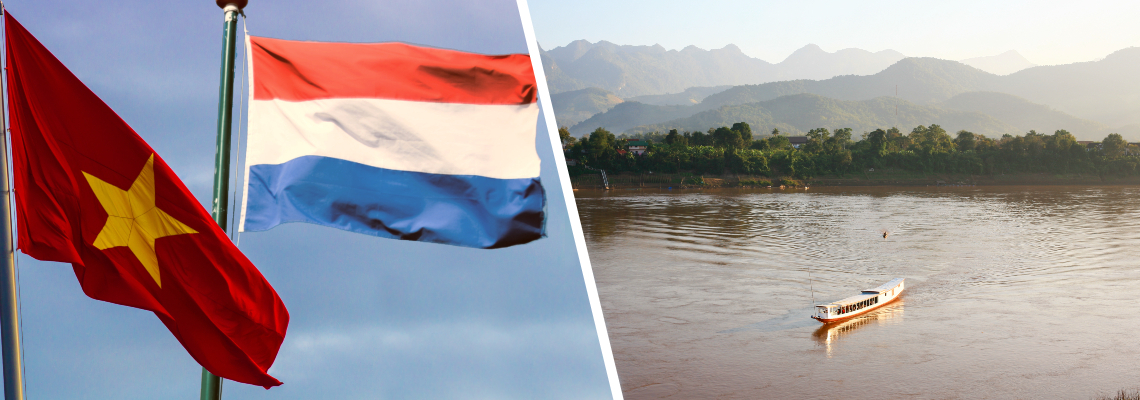Dutch delta support to help restore the mighty Mekong
The Netherlands is supporting Vietnam in a strategic partnership in water and sustainable agriculture, as part of the country's master plan for the Mekong Delta.
The Mekong master plan
The Mekong Delta runs through six countries and supports 60 million people through fishing and agriculture.
In recent years the 12th longest river in the world has been threatened by overfishing, deforestation, poaching, flood control initiatives and hydroelectric projects.
The strategy for the Mekong Delta Regional Master Plan, chaired by Vietnam's Prime Minister Pham Minh Chinh laid out the three pillars:
- Long-term planning
- Cross-sectoral collaboration
Integrated planning to support and catalyse the social, economic and environmental development of the delta.
The commitment includes “agriculture transformation” with the development of sustainable value chains in aquaculture, saline agriculture, fruit and vegetables, and sustainable livestock with a link to the water challenges.
Ten years ago, Vietnam requested the Netherlands' support in developing a master plan to protect and develop the Mekong Delta.
Today, the Netherlands will support the Ministry of Agriculture and Rural Development (MARD) to develop an Agro Transformation Programme to coordinate and boost this process with the Mekong provinces.
It will also foster a multi-stakeholder approach including the private sector, science, civil society and the international organisations and bilateral partners in strategizing, policy development and implementation.
Overcoming groundwater over-abstraction
The Netherlands will also support Vietnam in water management.
“The Netherlands remains committed to partnering with Vietnam’s government, private sector, science and non-governmental organizations to make the implementation of the integrated master plan a success.”
The nation will advise Vietnam on the protection of freshwater resources and coastal zones, improving water quality, climate change adaption and preparation in the case of natural disaster.
One of the biggest challenges affecting Vietnam is the consequences of groundwater over-extraction, which is causing more land subsidence and flooding than climate change.
Dutch consultancy and engineering firm Royal Haskoning DHV advised on the development of the Master Plan.
Speaking at the conference, Dutch ambassador Elsbeth Akkerman, said: "Going forward, the Netherlands remains committed to partnering with Vietnam’s government, private sector, science and non-governmental organizations to make the implementation of the integrated master plan a success to help the people, economy and nature in the Mekong delta thrive.”
Making the Mekong an agricultural business hub
The Master Plan is not just good news for the preservation of the Mekong Delta, it is also good news for potential investors.
The basin is home to the biggest inland fishery in the world, producing two million metric tonnes of fish every year.
Local farmers use the Delta to irrigate crops and to access opportunities for trade in Vietnam’s famous floating markets.
According to Can Tho University, the Mekong Delta produces 50 per cent of the nation's rice, 80 per cent of the nation's fruit, and 60 per cent of the nation's fish.
“Investing in inland waterway and seaports development will offer more opportunities to make Mekong Delta a regional agriculture business hub.”
Overall, 46 per cent of the total amount of food produced in Vietnam comes from the Mekong Delta.
A Master Plan outlining the Vietnamese government's long-term ambitions could be enough to convince potential investors to invest into new businesses in the Mekong.
“Investing in inland waterway and seaports development will offer more opportunities to make Mekong Delta a regional agriculture business hub,” said Gabor Fluit, vice president of the European Chamber of Commerce in Vietnam (EURO CHARM).
Earlier this year, the Egyptian Ministry of Irrigation and Water Resources turned to the Netherlands to help develop several projects. This included rainwater harvesting dams, building and maintenance of a rainwater drainage system in cities and villages, and carrying out studies looking into the planning and development of water resources.
Related content
- How water is bringing Egypt and the Netherlands together
- World's first "dual mode" desalination plant switches water sources
- The Dutch demand management drive on water behaviour change
Share your water technology stories with us
Do you have an innovation, research results or an other interesting topic you would like to share with the international water technology industry? The Aquatech website and social media channels are a great platform to showcase your stories!
Please contact our Sr Brand Marketing Manager Annelie Koomen.
Are you an Aquatech exhibitor?
Make sure you add your latest press releases to your Company Profile in the Exhibitor Portal for free exposure.
We promise never to send you spam and you can unsubscribe at any time!

